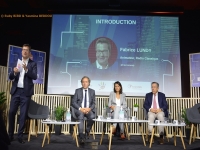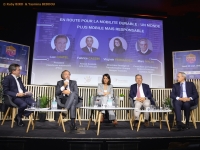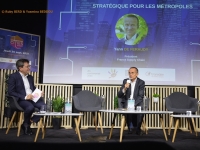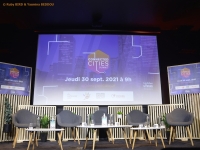Technology
CONNECTED CITIES 2021 - REPOSITIONING OF THE CITY OF TOMORROW
NEW FORMS OF MOBILITY
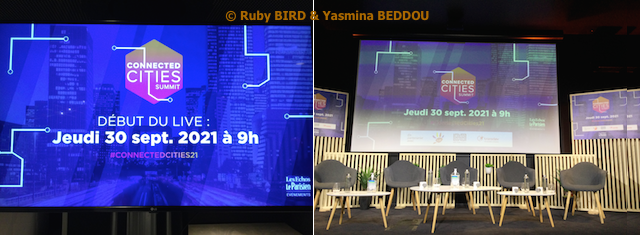
CONNECTED CITIES 2021 (Source: © Ruby BIRD & Yasmina BEDDOU)
USPA NEWS -
Cities municipal officials try to make the City not only more accessible but also more environmentally friendly. Efforts include the presence of a low emissions zone, a ban for most cars in the city center during specified periods, an increase in car sharing services,... On the one hand, there are big expectations with regard to future technologies and business models; on the other hand, there is an urgent need for a “double transformation.” In other words, preparing Companies for the mobility of tomorrow also means making today’s business crisis resistant.
Cities municipal officials try to make the City not only more accessible but also more environmentally friendly. Efforts include the presence of a low emissions zone, a ban for most cars in the city center during specified periods, an increase in car sharing services,... On the one hand, there are big expectations with regard to future technologies and business models; on the other hand, there is an urgent need for a “double transformation.” In other words, preparing Companies for the mobility of tomorrow also means making today’s business crisis resistant.
The Automotive Industry actually is quickly turning into a true mobility ecosystem. Today, we are seeing the emergence of a broader ecosystem. This Ecosystem is coalescing, as High-Tech players enter the market, incumbents form new partnerships. Given the challenges ahead, cooperation will become an even bigger success factor. For investors, executives, and enthusiasts alike, autonomous Technology and Self-Driving Cars have long been some of the most interesting areas within the future-of-mobility space. This continues to be so.
Moderator: Fabrice LUNDY Radio host at Radio Classique
Speakers:
Luc Chatel, President Plateforme automobile (PFA)
Fabrice Cassin, Associate Lawyer, LPA-CGR avocats
Virginie Fernandes, Director Strategy and Transformation Group, Groupe Transdev
Marc Ivaldi, Professor of Economics at Toulouse School of Economics (TSE) and at l'Ecole des Hautes Etudes en Sciences Sociales (EHESS) et consultant, NERA Economic Consulting
Speakers:
Luc Chatel, President Plateforme automobile (PFA)
Fabrice Cassin, Associate Lawyer, LPA-CGR avocats
Virginie Fernandes, Director Strategy and Transformation Group, Groupe Transdev
Marc Ivaldi, Professor of Economics at Toulouse School of Economics (TSE) and at l'Ecole des Hautes Etudes en Sciences Sociales (EHESS) et consultant, NERA Economic Consulting
Yet the underlying logic for Autonomous Driving, especially in Cities, remains intact. Electric, shared AVs—also called robo-taxis or -shuttles—could address mobility’s pain points in cities (such as road congestion, crowded parking spaces, and pollution) while revolutionizing Urban Mobility, making it more affordable, efficient, user friendly, environment friendly, and available to everyone.
Connected Cars are poised to become potent Information Platforms that not only provide better experiences for Drivers but also open new avenues for Businesses to create Value. The key success factor for Connectivity Services is the clear value proposition the offering has, either to an External Customer or to an Internal Stakeholder. It seems that this value is very often created only by combining Data Assets and Capabilities from various partners. While the signals are somewhat mixed for Autonomous Technology, this development was triggered by two Trends: tightening regulation and rising customer demand.
Photo (R)
Speakers:
Prudence Cadio, Associate Lawyer, LPA-CGR avocats
Franck Cazenave, Director Smart Cities, Bosch, France & Benelux
Anouk Legendre, Architect et Co-founder, XTU Architects
Jean-Louis Mounier , Co-General Director at BU TowerCo, TDF
Speakers:
Prudence Cadio, Associate Lawyer, LPA-CGR avocats
Franck Cazenave, Director Smart Cities, Bosch, France & Benelux
Anouk Legendre, Architect et Co-founder, XTU Architects
Jean-Louis Mounier , Co-General Director at BU TowerCo, TDF
In addition to safety, consumers are becoming more focused on digital channels and sustainability issues. Access to micromobility options (lightweight vehicles such as bicycles, e-scooters, and mopeds) will be important.Sustainable mobility must address long-term ecological sustainability, and this can be achieved through technological innovation and the efficient use of clean energy. But sustainable mobility should also address individual needs for travel, together with ensuring greater equity in terms of access to transport and its affordability.
Smart Buildings are gaining momentum – and as the technology behind them becomes more sophisticated and more prevalent, they’re set to change the way we live and work. The key difference between where we are now and where we’ll be in the future is the interface we use to interact with buildings. Over time we should find that buildings are increasingly adapting to our requirements, almost predicting our demands and facilitating the environment to ensure the user experience is hassle-free or very intuitive....
Connected Cities Summit (September 30, 2021 @ Les Echos-Le Parisien Headquarters in Paris).
The Summit was devided in Themes (animated by Fabrice Lundy, Columnist @ Radio Classique):
- On the road to Sustainable Mobility: a more mobile but responsible world
- Urban Logistics: increasingly strategic subject for Metropolitan Areas
- How 5G and IoT will transform Connected Cities into Smart Cities?
- Buildings & Sustainable Cities - what are the new major challenges?
Source: Connected Cities Summit (September 30, 2021 @ Les Echos-Le Parisien Headquarters in Paris).
Ruby BIRD
http://www.portfolio.uspa24.com/
Yasmina BEDDOU
http://www.yasmina-beddou.uspa24.com/
The Summit was devided in Themes (animated by Fabrice Lundy, Columnist @ Radio Classique):
- On the road to Sustainable Mobility: a more mobile but responsible world
- Urban Logistics: increasingly strategic subject for Metropolitan Areas
- How 5G and IoT will transform Connected Cities into Smart Cities?
- Buildings & Sustainable Cities - what are the new major challenges?
Source: Connected Cities Summit (September 30, 2021 @ Les Echos-Le Parisien Headquarters in Paris).
Ruby BIRD
http://www.portfolio.uspa24.com/
Yasmina BEDDOU
http://www.yasmina-beddou.uspa24.com/
Ruby Bird Yasmina Beddou Les Echos Le Parisien City Tomorrow New Forms Of Mobility Connected City 2021 Debate Health Crisis Economic Crisis Climate Crisis
Liability for this article lies with the author, who also holds the copyright. Editorial content from USPA may be quoted on other websites as long as the quote comprises no more than 5% of the entire text, is marked as such and the source is named (via hyperlink).

